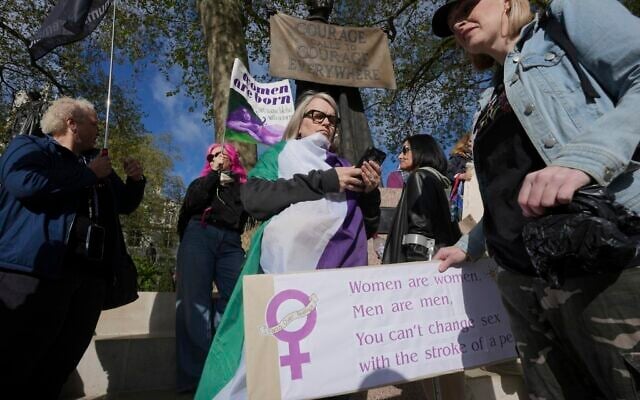
Susan Smith (L) and Marion Calder, directors of For Women Scotland celebrate as they leave Britain’s Supreme Court in London on April 16, 2025, following the court’s ruling on how to define a ‘woman’. (HENRY NICHOLLS / AFP)
| Published April 16, 2025
Government welcomes ‘clarity’ on issue; trans rights advocates condemn judgment, which Harry Potter author Rowling lauds for ‘protecting rights of women and girls’
In a landmark decision, the United Kingdom’s Supreme Court has unanimously ruled that the legal definition of “woman” under the Equality Act 2010 refers exclusively to biological sex at birth. This ruling excludes transgender women, even those possessing a Gender Recognition Certificate (GRC), from being legally recognized as women in contexts where the law specifies sex-based rights and protections.
The case originated from a challenge by the feminist advocacy group For Women Scotland against the Scottish Government’s Gender Representation on Public Boards (Scotland) Act 2018. The Act aimed to ensure that 50% of positions on public boards were held by women, including transgender women with GRCs. For Women Scotland contended that this inclusion diluted the intended representation of biological women.
The Supreme Court’s decision clarifies that, for the purposes of the Equality Act, terms like “woman” and “sex” are to be interpreted based on biological sex. This interpretation has significant implications for policies and services that rely on sex-based classifications, such as single-sex hospital wards, sports competitions, and women-only spaces.
“The Equality Act 2010 gives transgender people protection, not only against discrimination, but through the protected characteristic of gender reassignment,” he said, asserting that a person who “identifies” as transgender person with documentation recognizing them as female should not be considered a woman for equality purposes.
Supporters of the ruling, including author J.K. Rowling, have hailed it as a victory for women’s rights, emphasizing the importance of maintaining clear, biologically-based definitions to protect sex-specific spaces and opportunities. Conversely, LGBTQ+ advocacy groups have expressed concern, arguing that the decision may undermine the rights and recognition of transgender individuals.
While the ruling does not strip transgender individuals of protections against discrimination under the Equality Act, it delineates the boundaries of those protections in contexts where sex-based rights are specified. The Scottish Government has acknowledged the decision and indicated plans to assess its implications for existing and future policies.
This decision is poised to influence ongoing debates and legislative considerations related to gender identity and sex-based rights across the United Kingdom.
 Women’s rights activists hold placards outside the Supreme Court to challenge gender recognition laws, in London, April 16, 2025. (Kin Cheung/AP)
Women’s rights activists hold placards outside the Supreme Court to challenge gender recognition laws, in London, April 16, 2025. (Kin Cheung/AP)
What’s In It for You?
UK Court Ruling on “Woman” Defined by Birth Sex
✅ Protection of Women’s Rights and Spaces
As a conservative, this ruling affirms the core belief that biological reality matters. It means women’s rights are protected as originally intended—especially in areas like sports, healthcare, public boards, and single-sex spaces. You can rest assured that policies meant to uplift women will benefit actual biological females, not redefined categories.
✅ Pushback Against Gender Ideology
This is a major win against radical gender activism that seeks to erase the distinction between men and women. It sends a message that legal and social institutions should not be forced to conform to fluid or self-declared identities that conflict with biology and common sense.
✅ A Precedent for Other Countries
This UK ruling could influence other nations, including the U.S., to reassert biological definitions in law. It builds momentum for reclaiming traditional values and protecting the foundation of women’s rights without compromising them to appease progressive ideologies.
✅ Clarity in Law and Policy
You benefit from a return to clear, objective definitions—not legal confusion. This helps schools, employers, and institutions craft policies based on facts rather than feelings, which supports fairness and consistency.
✅ A Cultural Turning Point
This could be seen as a tide-turning moment in the cultural war—where truth, reason, and traditional values begin to regain ground in courts and legislation.
Overall Takeaway:
The UK Supreme Court’s ruling is a decisive win for common sense, biological truth, and the protection of women’s rights. By affirming that the legal definition of “woman” is based on biological sex, the court has pushed back against the aggressive spread of gender ideology that many conservatives view as eroding real women’s spaces and rights.
This ruling isn’t just about policy—it’s a cultural statement that facts matter, and that governments cannot simply redefine foundational terms to suit progressive agendas. It sets a precedent that could inspire similar legal action and legislative clarity in other countries, including the U.S.
In a world where definitions are being blurred and truth is often up for debate, this verdict marks a moment of clarity, courage, and a return to reality. For conservatives, it’s a powerful affirmation that truth still has a place in law and society.
In short: You win with truth, fairness, and the defense of reality.
SOURCES: NEWSMAX – UK Top Court Rules Definition of ‘a Woman’ Based on Sex at Birth
THE TIMES OF ISRAEL – UK’s top court rules definition of a woman is based on biological sex
REUTERS – In landmark ruling, UK’s top court says legal definition of woman refers to biological sex
AL JAZEERA – UK’s top court rules legal definition of ‘woman’ refers to ‘biological sex’





Be the first to comment